Which Euros was the best? Rating tournaments from 1976 to 2016
Euro 1976
Despite the feelgood factor that Euro 96 brought to the country, Euro 76 in Yugoslavia remains my favourite. It’s the first international football competition I can really remember. I was nine years old, playing in a kid’s team and getting into football properly. I mostly spent my time back then playing cricket, reading Roy of the Rovers, or Shoot, drinking copious amounts of Tab, Coke or 7 Up and saving up to buy a Yorkie bar at the weekend.
The tournament on that long, hot summer was all blurry satellite connections and slightly distorted sound on the commentary. But it was magical, seeing these faraway faces and discovering new teams like Czechoslovakia and Yugoslavia coming up against West Germany and the beautiful Dutch.
The penalty shootout in the final was the highlight – well, one moment in that shootout: watching that impossible penalty and seeing my dad jump off the sofa when it went in. This was the 1970s remember and, for good or bad, Germany were still the villains. My abiding memory is of my old man, whose left-leaning sympathies got the better of him! Thank you Mr Panenka. David Bailey
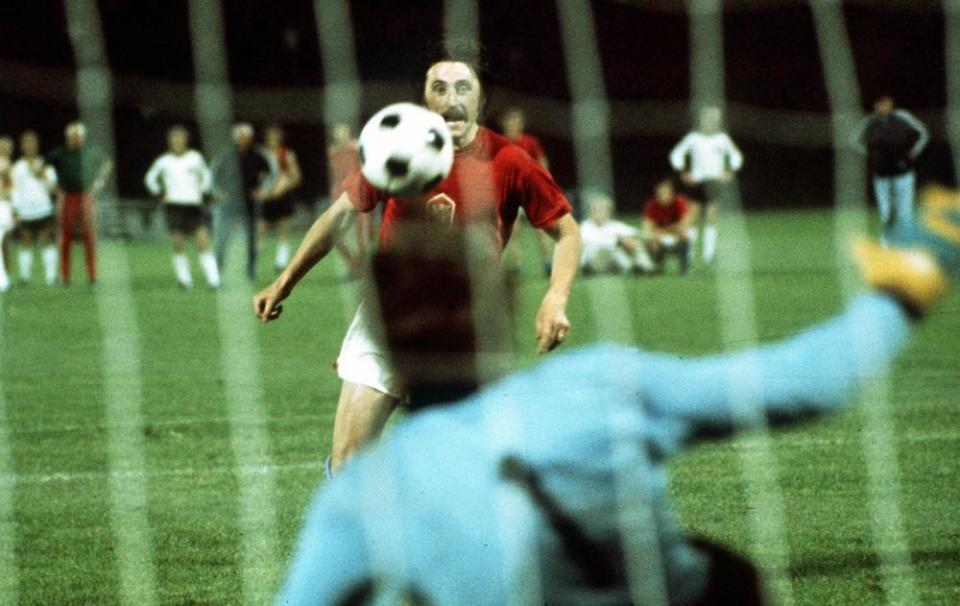
Euro 1980
Euro 80 was my first and it remains – along with David Lynch’s Blue Velvet – the most impressive thing I have seen on a TV screen. I was nine years old and it was the first time I saw Bernd Schuster with a football. That tournament also coincided with my first french kiss. Vasco Miguel de Oliveira Costa
Euro 1984
Even though Euro 88 should be my favourite because it was Ireland’s first tournament, Euro 84 in France is my real favourite. It’s more to do with the associated memories than the football. I was just out of secondary school and a friend and I had gone to County Galway in the west of Ireland on a camping trip. We had virtually no money and for the first couple of nights “squatted” in a campsite near the small town of Barna. We were discovered and kicked out after two nights but only moved across the wall at the end of the property and into someone’s field by the sea for the remainder of the week. We would nip back across the wall to watch matches in the campsite’s common room – just fantastic memories of life and football intertwined, which is the way most fans remember significant matches or tournaments.
Related: How France hosted and won Euro 1984 (and British TV ignored the action)
“Foreign” footballers were still so exotic and they wouldn’t be for too much longer. I loved the Danish striker Preben Elkjær that summer – what a combination of power, skill and those Hummel chevrons – but you cannot go beyond that victorious France team as the highlight of the tournament. Michel Platini (pity how that turned out), Alain Giresse, Jean Tigana and Patrick Battiston were just beautiful to watch. Platini earned the plaudits but, for me, Giresse was the star. The final was a bit of a letdown but it didn’t matter. The team was on a different level.
I scrounged odd jobs all summer, hung out with my friends and my girlfriend, and played various sports. I remember setting off one day to hitchhike to the orientation day at my chosen college, Maynooth, but decided to ditch that plan and hitchhike to Dundalk instead so I could buy tickets to see Bob Dylan play Slane Castle later in the summer – there was no Ticketmaster in those days. I missed the orientation day and wouldn’t see the college until my first day in October, but I did see Dylan, Santana, UB40 and In Tua Nua, with Bono and Van Morrison joining Dylan for a couple of songs. As with all summers in your youth, it felt like the weather in the summer of 1984 was a constant parade of sunny days and clear nights. Seamus O’Reilly
Euro 1988
I can pinpoint the day I became a football fan to Sunday 12 June 1988, when my dad called me in from playing outside to come indoors and watch Ireland play England in Stuttgart at Euro 88. Despite being seven years old and not being aware of the significance of Ireland’s victory at the time, I had an inkling something momentous had happened as my dad insisted on taking our family out to celebrate at a country pub, which was full of happy people on a warm Irish summer afternoon.
Ireland scoring early and then hanging on grimly for the remainder against England, playing superbly against the USSR but only emerging with a draw, and losing heartbreakingly in the last 10 minutes to the Netherlands was a comprehensive and fair introduction to supporting our boys in green. Marco van Basten’s goal in the final was an obvious highlight yet, being parochial, I would have to nominate Ronnie Whelan’s spectacular effort against the USSR as a close second. It took some pretty spectacular efforts to get the better of Rinat Dasayev that summer. Jonathan Collins
Euro 1992
Euro 92 is my favourite because Denmark won it and I am Danish. I was 18 years old and had just finished my A-levels when the tournament was being played. When we finish our exams in Denmark, everybody throws a party at their home, which means you’re basically partying every night for weeks. My party happened to be on the night of the final, so you can imagine the atmosphere.
The party started in the afternoon – with a five-a-side tournament in my parents’ garden, including a beer tap on the sidelines. When John Jensen made it 1-0 for Denmark against Germany, somebody popped the champagne and it went straight on to the TV we were using to watch the final – the only TV in the household, which was small by today’s standards yet catered for 40 people. The TV went black for a while, but we didn’t panic. We found a hairdryer and threw maximum heat at the TV to dry it. It started working again 10 or 15 minutes later. And the rest is history. The final was nerve-wracking and mind-blowing. We couldn’t believe we could win the thing – especially against the world champions. Steen Ulrich
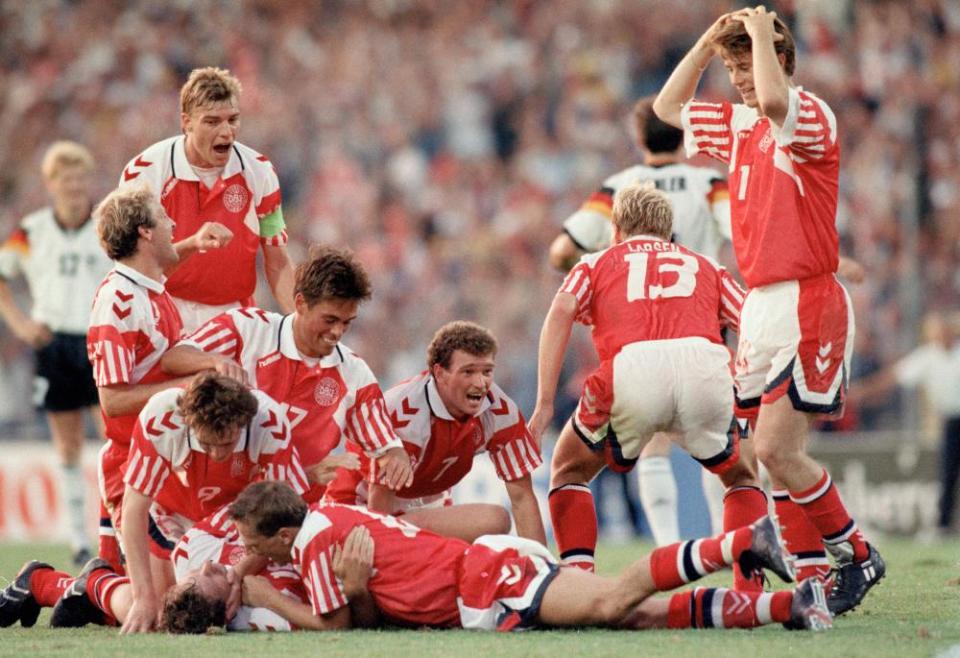
Euro 1996
I’d graduated from university the year before and spent a further year “working” at the university – basically still behaving like a student but getting paid for it. I watched the tournament with the university women’s football team, which I’d started up only two years before. We’re still great mates now. In fact, we had our 25-year reunion last year in the same student bar where we watched some of the matches that summer. Watching a home tournament with people who turned out to be lifelong friends amid so much hope. What more could you ask for?
Two Alan Shearer goals from Euro 96 stand out for me. Firstly, his second against the Netherlands. I loved Gazza’s skill in the build-up but, even more than that, Teddy Sheringham shaping to shoot and then squaring it to Shearer and putting the Dutch defender on his backside. Just shading that was Shearer’s opening goal against Germany in the semi-final. I’d kitted myself up; we’d painted our faces; and I was sitting on a beer crate right in front of a massive screen at Pumphrey’s cocktail bar in Bournemouth. We all had fresh pints so, when the goal went in, arms went up and beer went down and I was drenched. It all ended in tears, literally, and I was pictured looking very mournful on the cover of the local paper the following day.
My job at the university finished just after the tournament so I essentially spent that summer on the beach, playing football, drinking and sunbathing. If we’d won – if only we’d won – it would have been pretty damn perfect. Kate ‘Bob’ Vogelsang
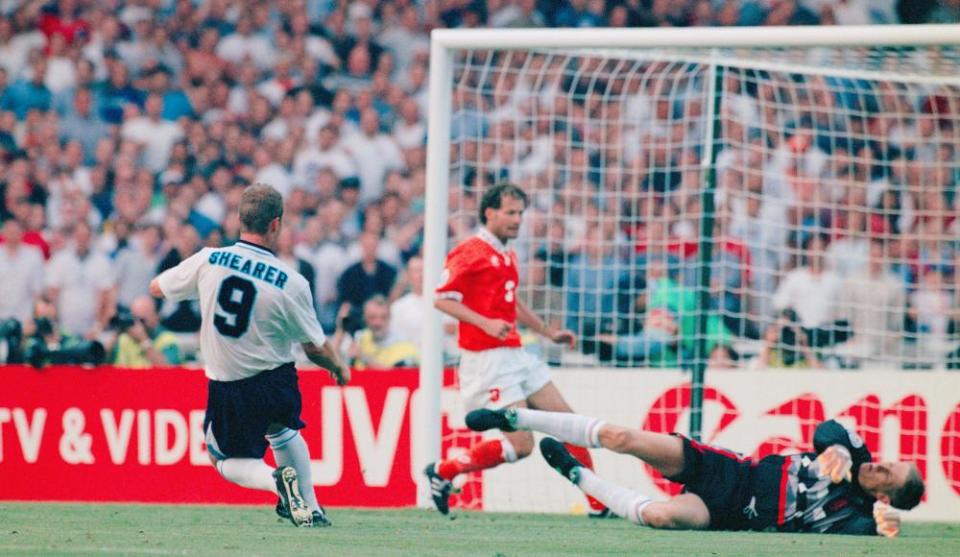
Euro 2000
Nothing captures football’s magic quite like the first major tournament you remember really engaging with as a kid. As an eight year-old that summer, Euro 2000 was special even though England were poor and crashed out early. It feels like a forgotten tournament these days, placed in a kind of purgatory between England’s ecstasy at Euro 96 and the modern era.
Not having Sky at the time, the excitement of watching three football matches a day featuring players like Gaizka Mendieta, Luís Figo and Youri Djorkaeff felt unparalleled. I was particularly tantalised by the magnificent Dutch team of Patrick Kluivert, Dennis Bergkamp and Marc Overmars as they destroyed Yugoslavia 6-1 in the quarter-finals (while I ate scrambled egg on toast for the first time).
I also recall my parents videotaping the whole 90 minutes of the England v Germany game so we could all watch it together the following evening. This meant having to beg my schoolmates not to tell me the result. As far as I remember, I somehow managed to get to the end of the day still living in ignorance. It would be impossible in today’s world.
It was my birthday during the tournament and I remember getting a Playstation from my parents, accompanied by the official Euro 2000 game. The dusty old disc retains a treasured place on the CD shelf and in my memory, not least because of the fun you could have hacking the keeper while he had the ball in his hands. Other quirks included the fact it was seemingly impossible to miss a penalty and co-commentator Mark Lawrenson’s hyper-critical heckles of players in the game’s training mode. “I’m afraid that’s just not good enough,” is one withering line that remains etched into my brain. David Spereall
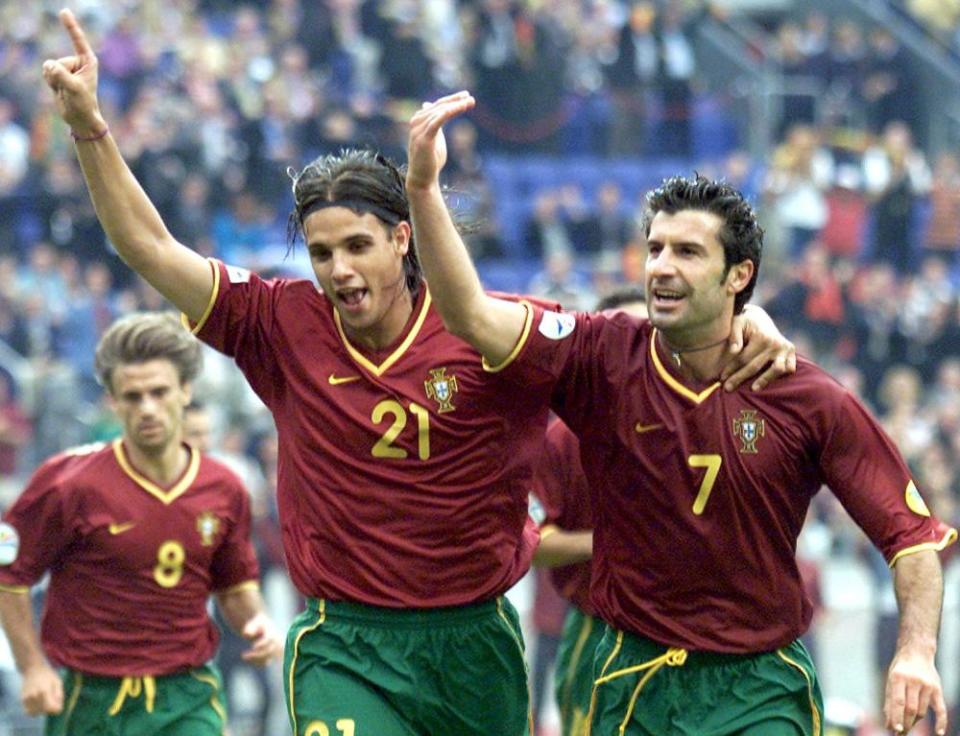
Euro 2004
Everywhere you looked at Euro 2004 there seemed to be superstars, whether playing for hosts Portugal, perennial dark horses Czech Republic or the “golden generation” of England. The beautiful scenery of Portugal gave the perfect backdrop for a dramatic summer of football that culminated in an underdog story only rivalled by Leicester’s title triumph in recent years. The quality of the players seemed to be spread far and wide and there were classic games throughout: from the opening game between Greece and Portugal, the all-time classic between the Czech Republic and the Netherlands in the group stage, and the quarter-final between the hosts and England.
Related: Football quiz: who scored the last goals at these tournaments?
The tournament was littered with truly gripping games. As a Scot, I enjoyed England’s late show to grab defeat from the jaws of victory in their opener against France, however seeing Greece complete their fairytale in the final was the highlight. Yes, I know they were defensive and dour, but they were also rank outsiders and I couldn’t help but fall in love with the underdogs: Giorgos Karagounis as the schemer probing, twisting, diving and providing; Traianos Dellas as strong as a Greek God at the back; and Angelos Charisteas capping off a heroic performance as a one-man battering ram with the winner in the final.
We visited Greece later in the summer holidays and I badgered my mum to buy me one of the knock-off football shirts from the market. I was so pleased to get my hands on one with the goalscoring hero, Charisteas, on the back. Michael Guest
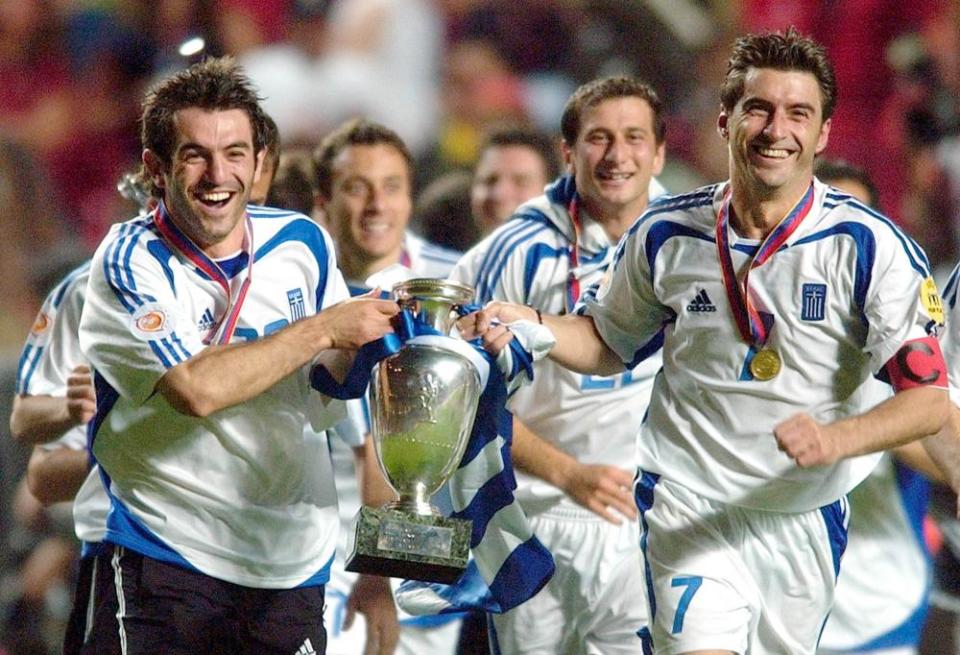
Euro 2008
The Spain side that won Euro 2008 was really good to watch and much more satisfying than their more ruthless but boring team that won the World Cup in 2010. They were worthy winners.
However, more importantly, this was the first tournament I can remember when England did not qualify. I could watch with no concerns and just really enjoy the football. I began to have favourites, among them Spain and Russia, but if teams were knocked out it wasn’t the huge deflationary experience that watching England routinely fail to fulfil expectations was, especially in the era of the “golden generation”. It was incredibly liberating and reignited my interest in football generally.
Since then, I have approached other tournaments in a similar way and learned to take the time to find out about other countries, their stories, their heroes and villains. I guess it broadened my horizons. I also discovered Football Weekly at the same time, so that was good. Ross Francis
Euro 2012
While I am ostensibly an England fan, I have attended many tournaments and usually watch any games for which I can get tickets. Euro 2012 is my favourite as it was a great experience overall. My friend and I went to six matches in Poland and Ukraine. We flew to Krakow, rented a car and travelled around Poland, visiting many places including the Tatras mountains and, in an afternoon that generated soul-searching, Treblinka.
We stayed with friends and made friends. We watched matches in Warsaw, Wroclaw and Gdansk, a city I enjoyed so much that I’ve been back a few times since. We also saw a couple of matches in Lviv – the rental car was not insured to cross the border, so we parked up in Poland, crossed the border on foot and had a Ukrainian travel guide collect us in his car. We are still friends with him and his family.
I met lovely Ukrainian and Polish people throughout the trip, but also a number of football fans from different countries. I remember drinking beer with thousands of German fans in Lviv – they could not have been more welcoming.
The stadiums were fabulous; the sight of the amber stadium in Gdansk lives long in the memory. The football wasn’t bad either. While the tournament was eventually won by possibly the greatest European team ever, Spain, they were given a good run for their money in the group by Italy. Although the Italians could not live with them later on in the final. Roger Kay
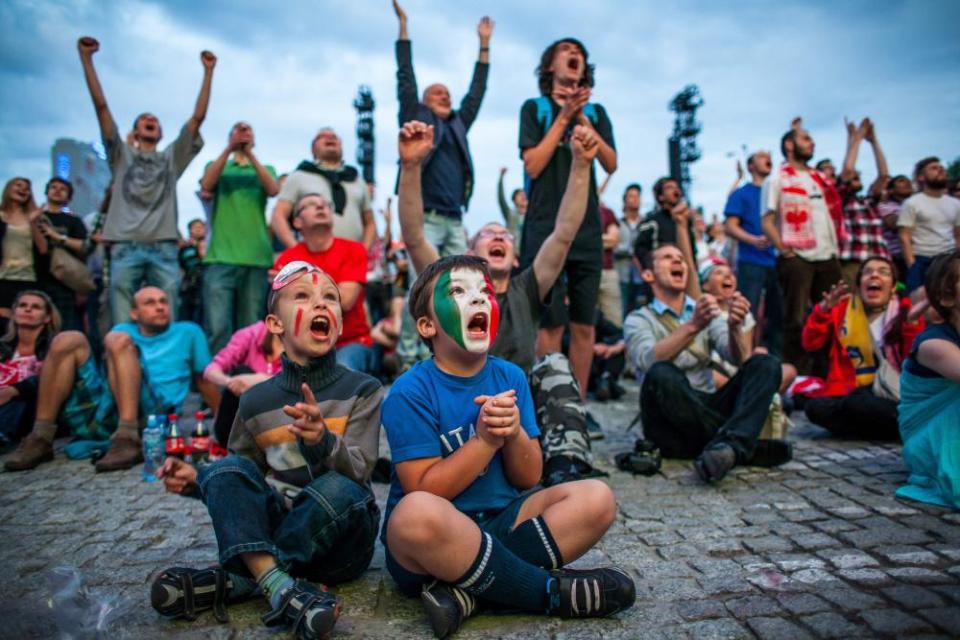
Euro 2016
Being Portuguese, I’m very biased. But I can’t pass up the chance to rave about Portugal winning their first major title and beating France for the first time in 40 years after semi-final heartbreaks at World Cup 2006, Euro 2000 and Euro 1984. For all of the talk of Portugal being underwhelming champions, their games were a lot of fun and produced a lot of great moments.
Related: Which is the best World Cup ever? Rating contenders from 1954 to 2014
Beyond Portugal, you had the wonderful runs of Wales and Iceland, the Republic of Ireland beating Italy, and both them and Northern Ireland making it to the last 16. You had Hal Robson Cruyff, the Italy v Germany penalty shootout in the quarter-final, Renato Sanches exploding in his first major tournament, and so many other great moments. It proved that an expanded tournament could be a success.
The highlight was the final, when Eder scored the only competitive goal of his Portugal career. I had just moved to a new job in a new location, temporarily away from my wife and family. I returned home for the weekend of the final to watch it with my family. I remember going absolutely nuts. I was lifted by more people that day than when I was a baby. Jose Casares
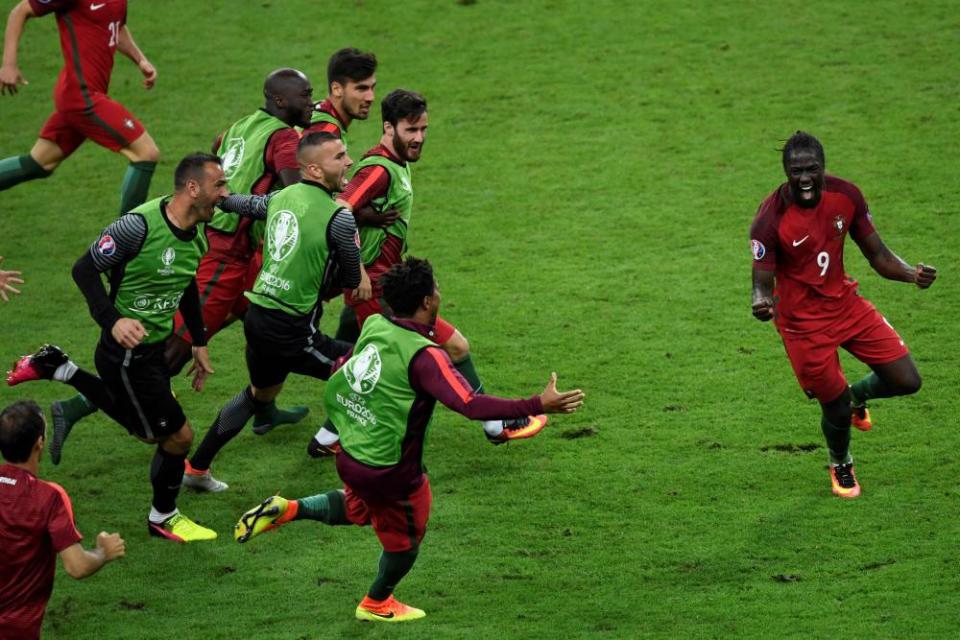

 Yahoo Sport
Yahoo Sport 





































